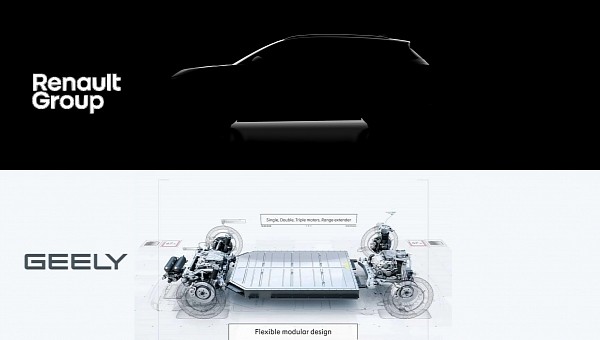The internal combustion era is over, and we enter a time when carmakers would not even want to admit they still build anything that burns fuel. Renault, for instance, has formed a joint venture with Geely to outsource its ICE and hybrid powertrains production.
Renault has announced a major overhaul of its operations, and an important part of the new business plan is getting rid of combustion engine production. But because the company still needs them until the electric revolution catches on, a compromise solution was required. Renault has signed an agreement with its Chinese partner Geely to form a new, equally-held joint venture that will supply gasoline engines (including electrified variants) to the brands they own and to other automakers.
The joint-venture company would employ more than 19,000 people at 17 powertrain factories and five R&D centers on three continents. The new company, based in London, will start operating next year. It will have the capacity to supply about five million engines and hybrid systems to Renault and Geely brands, including Renault, Dacia, Geely Auto, Volvo Cars, Lynk & Co, Proton, as well as Nissan and Mitsubishi.
“We are pleased to have agreed plans for an ambitious partnership with Geely to keep developing the ICE and hybrid engine technologies that will remain a critical part of the automotive supply chain for decades to come,” said Luca de Meo, CEO of Renault Group. “We’ll be able to offer best-in-class powertrain and electrified solutions to multiple OEM brands worldwide, unleashing the market potential for this low-emission technology.”
As the internal combustion engine era goes into the sunset, and the brands mentioned above would use fewer combustion engines due to going all-electric, the new joint venture will also be able to supply other carmakers. Renault thinks the company’s combined product portfolio and regional footprint could offer solutions for 80% of the global ICE market.
Before the deal was announced, concerns about Nissan’s technology being transferred to China were expected to hamper an agreement long in the making. Renault and Nissan are tangled in a complicated partnership, which prevented Renault from spinning off its combustion engine production earlier. The 50-50 partnership solution was chosen to get Nissan onboard and move things further.
The joint-venture company would employ more than 19,000 people at 17 powertrain factories and five R&D centers on three continents. The new company, based in London, will start operating next year. It will have the capacity to supply about five million engines and hybrid systems to Renault and Geely brands, including Renault, Dacia, Geely Auto, Volvo Cars, Lynk & Co, Proton, as well as Nissan and Mitsubishi.
“We are pleased to have agreed plans for an ambitious partnership with Geely to keep developing the ICE and hybrid engine technologies that will remain a critical part of the automotive supply chain for decades to come,” said Luca de Meo, CEO of Renault Group. “We’ll be able to offer best-in-class powertrain and electrified solutions to multiple OEM brands worldwide, unleashing the market potential for this low-emission technology.”
As the internal combustion engine era goes into the sunset, and the brands mentioned above would use fewer combustion engines due to going all-electric, the new joint venture will also be able to supply other carmakers. Renault thinks the company’s combined product portfolio and regional footprint could offer solutions for 80% of the global ICE market.
Before the deal was announced, concerns about Nissan’s technology being transferred to China were expected to hamper an agreement long in the making. Renault and Nissan are tangled in a complicated partnership, which prevented Renault from spinning off its combustion engine production earlier. The 50-50 partnership solution was chosen to get Nissan onboard and move things further.








